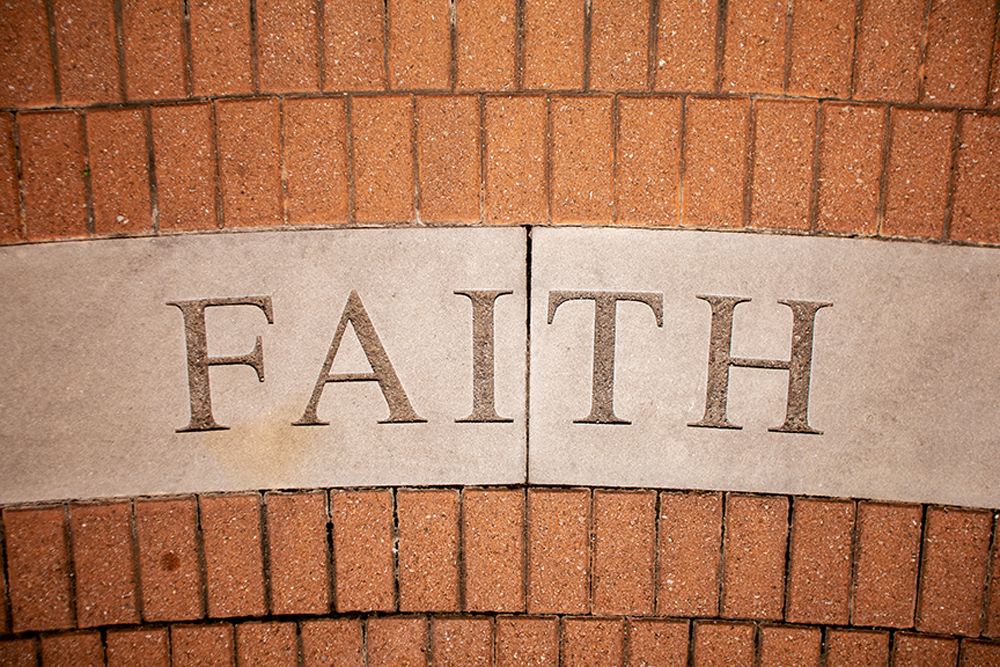

Building Interfaith Bridges
By keeping the faith dialogue open and respectful, TCU prepares students for a religiously diverse world.
Morning light filtered through stained-glass windows as 30 TCU students gathered in the sanctuary at Beth-El Congregation, a Reform Jewish synagogue in central Fort Worth. The docent who had welcomed them stepped beneath the ner tamid, the eternal flame, and opened the heavy brass doors of the ark to reveal the congregation’s Torah scrolls.
He showed the visitors a scroll that survived the Holocaust, saved from a Jewish community in a farming village outside Prague that was destroyed by the Nazis, and unrolled it so the students could see the Hebrew lettering.
Jonah Murray ’21 stepped closer to look at the delicate handwritten text. Murray described feeling honored that the congregation would share its treasure with a group of largely non-Jewish students.
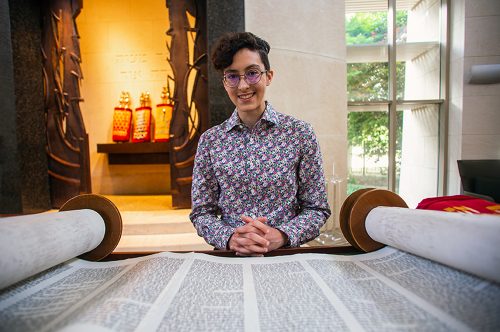
Jonah Murray was among the TCU students touring Fort Worth worship spaces, including Beth-El Congregation. “As a Catholic person, I feel connected to the Jewish faith because our roots are in Judaism,” Murray said.
“As a Catholic person, I feel connected to the Jewish faith because our roots are in Judaism,” Murray said.
“I always like being able to learn about Jewish people and the Jewish faith, so experiences like that were really valuable.”
That afternoon, the students boarded a bus and rode to the Hindu Temple of Greater Fort Worth.
At their destination, the visitors left shoes at the door before meeting a representative who showed them the temple’s deities, some surrounded by offerings of flowers.
Kundan Chaudhary ’22, a Hindu from Nepal, used the opportunity to share insight on his religion with students on the excursion. While at TCU, he had taken a course on Islam and had been involved with two Christian clubs. “I want to celebrate my religion and value my traditions, but at the same time I want to learn about the traditions of different religions,” he said. “TCU has been a good place for that.”
The Interfaith Bus Tour, coordinated by the Office of Religious and Spiritual Life, introduced students to multiple worship spaces in Fort Worth. The experience was meant to deepen participants’ understanding of these religions and expand their capacity for interreligious dialogue.
While college offers students the chance to study other religions and make friends from different faiths, higher education also can be a training ground for leaders who are skilled at mediating religious conflict. The bus tour and TCU’s other interfaith activities are designed to prepare students to build bridges in a religiously diverse world.
“Knowing how to approach and talk to people who are really different from you makes you a better neighbor or better worker or better friend,” said Britt Luby ’06, a former associate chaplain in TCU’s Office of Religious and Spiritual Life who launched the Interfaith Bus Tour.
“ ‘Interfaith leader’ is going to be a new résumé-builder one day,” she said. “You’re going to want that line: ‘I know how to bring people from different religious traditions together, and I’m religiously literate.’ ”
The initiatives stem from the university’s emphasis on inclusive excellence and its historical association with the Disciples of Christ denomination, which values interreligious education, respect and dialogue.
The interfaith programs also align with TCU’s strategic plan, Vision in Action: Lead On, which prioritizes diversity and inclusion — a theme that informs goals such as recruiting a diverse student population and developing all students’ cultural and global awareness.
“Obviously not everyone in the world is a Christian,” said Ella Johnson, a sophomore political science and religion major and president of the Disciples of Christ student group, Disciples on Campus.
“Nine times out of 10, when you go into a group of people, you’re going to interact with people who have a different religion than you. It’s going to make you a better person and a more understanding and empathetic individual if you understand something so core to their identity.”
PLURALISM DEFINED
College is many students’ first exposure to religious perspectives other than their own, either in the classroom — the core curriculum requires students to take a course in religious traditions — or in club meetings or residence halls. Having a serious conversation with a person from a different faith requires participants to interrogate and articulate their own beliefs. Many end up clarifying a commitment to their own faith while broadening their understanding of the role of religion in other people’s lives.
“My experience — and I think a lot of people’s experiences with interfaith [dialogue] — is that it actually strengthens your own resolve in your religion,” Murray said. “I’ve found interfaith to be a great strengthening tool for grounding me more deeply in my Catholicism and in my relationship with God.”
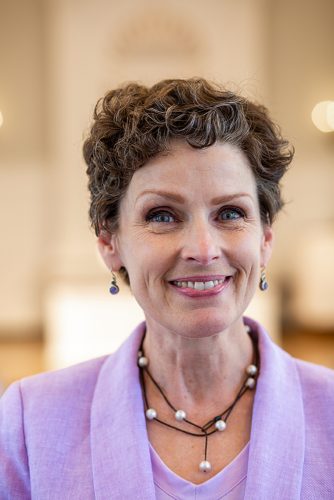
Jan Quesada uses case studies in her introductory interfaith course to teach students how to defuse religious tensions. “It’s an opportunity for students to consider this scenario of religious clash and offense in a very pragmatic, real-world, contemporary American context,” she said.
Interfaith work encourages students to find common ground without suggesting all religions are fundamentally the same.
In an interfaith studies course, Jan Quesada, a senior instructor in religion, introduces the idea that “pluralism does not mean this mush of, ‘All religious traditions are the same; we all basically believe the same thing,’ ” she said. “It’s about trying to have a respectful understanding of religious distinctives. You can respect and appreciate other people’s tradition without giving up your own.”
Her former student Lex Drake ’21, who majored in religion and women & gender studies, said the idea that the world’s religions are not different paths to the same ultimate goal was at first startling.
Drake remembered being struck by a passage from When One Religion Isn’t Enough: The Lives of Spiritually Fluid People by Duane Bidwell ’88 (MDiv ’77, PhD ’03). “I do not believe that God is one or that all paths reach the same mountain,” Bidwell writes. “Religions are not different descriptions of a single reality; they describe different (and sometimes related) realities. … Each religious and spiritual path leads to its own mountain.”
The idea took a while to digest, Drake said. “At the time, I was very much in the zone of, ‘Yes, all religions should work together because we’re all going for the same thing.’ And then after that, I was like, ‘How do we still work together?’ ”
The Office of Religious and Spiritual Life helps answer that question by setting the stage for students to listen to one another and find mutual understanding despite their differences.
DINNER AND DISCUSSION
At a pre-pandemic Know Your Neighbor Night, two dozen students sat down for dinner in Jarvis Hall with relative strangers. The event was open to all students, but the organizers, who included Murray and Fatima Burney ’21, fellows in the Office of Religious and Spiritual Life, had intentionally gathered a diverse group by inviting the Muslim Student Association, the Collegiate Recovery Community, the Black Student Association and the Disciples of Christ student group.
At each table, the conversation began with icebreaker questions: Where are you from? What activities are you involved with? Where do you see yourself in 10 years?
The organizers then nudged the students to tackle more difficult prompts: Think about an identity you hold and a moment when you’ve been made to feel unwelcome because of it. Now think of a time when you felt welcome, fully seen and heard. What can we do at TCU to create more of the latter?
“It was a good way for people of different faiths and different backgrounds to get to know each other,” Burney said. “A lot of people are going through struggles that you don’t see, and having those deeper conversations made me more cognizant of that.”
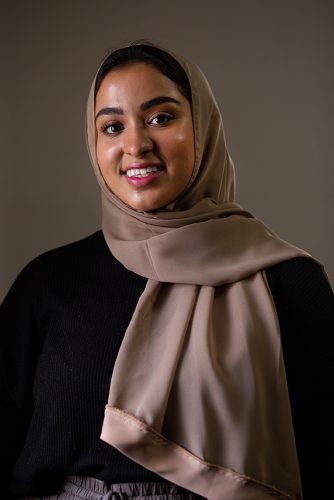
Fatima Burney says she has felt the sting of negative stereotypes about Muslims, but interfaith education efforts such as TCU’s can help dismantle those misconceptions.
In fall 2021, students from Disciples on Campus invited peers in the Muslim Student Association and TCU Hillel, a Jewish student group, to a similar event. Addison Gardner ’19 (MDiv ’22), then a Brite Divinity School student and Disciples on Campus minister, managed logistics, like ensuring the evening’s enchiladas would be suitable for both kosher and halal diets.
At the end of the evening, Gardner asked the 30 participants to write down a word or phrase that summarized the evening. She later posted the cards outside her office: Understanding. Solidarity. Unity. Community.
Interfaith activities such as Know Your Neighbor Nights give students a chance to learn about one another’s experiences in a structured, respectful way. The ground rules: What’s said at the table stays at the table. Speak only for yourself, not for an entire group with which you identify. Let others do the same.
Burney, a Muslim, said she knows how it feels when those rules aren’t followed. Since she started wearing a hijab in sixth grade, people have been asking questions about her religion, some more charitable than others. In one of her TCU classes, students read an article critical of Islam. Burney was the only Muslim in the room. “I felt like I had to explain myself and my experience,” she said, “when I didn’t necessarily want to be put in that position.”
To foster more understanding and dialogue, the Muslim Student Association in April invited the campus community to learn about the holy month of Ramadan and join in an iftar, the evening meal to break the day’s fast. TCU Hillel has taken students — both Jewish and non-Jewish — to a Passover Seder at Beth-El Congregation.
“We see part of our mission as educating the broader community about Judaism,” said Mimi Zimmerman ’22 MTS, TCU community adviser to Hillel. “It’s important to have events for Jewish students to get together as a community, but it’s equally important to be open to [students of] other faiths who are interested in learning more about Judaism.”
THE DISCIPLES INFLUENCE
In addition to comporting with TCU’s strategic plan, interfaith understanding is a value the university shares with the Disciples of Christ.
Associate chaplain the Rev. Lea McCracken ’00 leads the Religious and Spiritual Life office’s interfaith programs and serves as church relations officer, a liaison between the university and the Disciples of Christ church. She said the denomination offers people freedom to practice their faith however they encounter the Holy Spirit. That perspective extends beyond Christianity to other religions and informs the Disciples’ emphasis, particularly in youth groups, on interfaith education and dialogue.
“There’s automatically this understanding that if we’re on our own journey, then others are on their own journey,” she said. “God is revelatory in bigger ways than just our own understanding through Christ.”
Miranda Sullivan ’21, who was heavily involved in Disciples of Christ youth activities in high school, remembers learning about Judaism and Islam in her youth group. Growing up, “It was just important to understand where other people were coming from and respect other people’s beliefs and interact with people who believe differently,” she said. “That was something that was instilled in me really young by the Disciples of Christ.”
At TCU, Sullivan, who majored in religion and political science, was a leader in Disciples on Campus and attended interfaith events.
“I learned so much in my religion classes and in Disciples on Campus that broadened my worldview of not only my own faith, but generally what religion looks like in the world and what meaning looks like in the world,” she said. “So much of religion is a search for meaning, and people find this meaning in such different ways.”
In spring 2022, Gardner and Disciples on Campus organized a service project followed by an interfaith experience.
In the experiential component, representatives from various religions shared an aspect of their religious expression, such as a prayer, sacred text or meditation. Operating from a stance of unity, not uniformity, Gardner said, meant “seeing that differences are something to be celebrated, something to be recognized and affirmed.”
Even the process of designing the event required religious literacy. While some religions would welcome non-adherents to participate in their prayers or rituals, such behavior would be inappropriate in others.
DIWALI DAYS
In addition to organizing events for students from multiple faiths, the Office of Religious and Spiritual Life has expanded its efforts to meet the needs of Christian and non-Christian students. Its staff roster includes part-time advisers to the Jewish and Muslim student groups.
Staff members also work with the South Asian Inter-Cultural Association, which hosts cultural activities open to all students but comprises a number of Hindus.
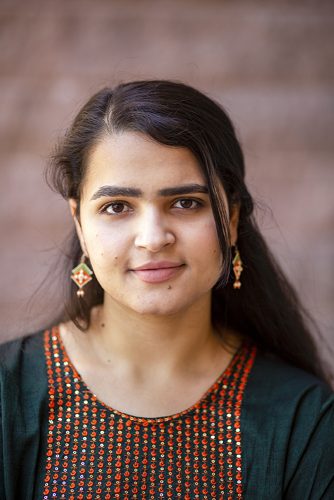
Divyanshi Singhal’s participation in activities such as organizing a Diwali dinner for fellow Hindu students helped her combat the isolation she sometimes felt on campus.
Divyanshi Singhal ’22, who served as president of the South Asian student group, came to TCU from the state of Uttar Pradesh in northern India. Her move to Texas underscored the role religion had played in her life at home
“One thing that you don’t really consider when you’re applying to colleges, especially abroad, is your religious identity,” Singhal said. “I think I took that for granted being a Hindu, which is a majority religion in India. Changing from a majority identity group to a minority identity group, not only in terms of my race but also my religious identity, was a huge culture shock.”
During Singhal’s first semester at TCU, she went to class during Diwali, a significant Hindu festival, for the first time ever. In India, the five days of Diwali were school holidays spent with family. Together, Singhal and her relatives would decorate the house and celebrate with rituals, a traditional feast and fireworks. In Fort Worth, surrounded by non-Hindus, she missed that sense of community.
The same semester, Singhal took a course on the Quran taught by Samuel Ross, an assistant professor of religion. On the first day, Ross quoted Max Müller, a German scholar of comparative religion: “He who knows one, knows none.”
Müller was observing that people who study other religions can better understand their own, Ross said. Most of Ross’ students were not Muslim, but they could use their newfound knowledge of Islam to develop a more nuanced perspective on their own faith, if they had one.
The idea resonated with Singhal and shifted her perspective on being a religious minority. Instead of focusing on the isolation she sometimes felt, she said, she could view the experience as an opportunity to learn about other faiths and better understand Hinduism in the process.
In Singhal’s sophomore year, she worked with Murray to organize a Diwali dinner for Hindu students. “That was the first time I truly felt a sense of belonging in terms of my religion,” she said.
AN INCLUSIVE HOLIDAY POLICY
Singhal also served on the Religious Advisory Council, first organized in 2017 by Luby to discover how TCU could better support students’ religious needs. Singhal said the experience was another venue for learning about other religions. “It’s a very safe space where you can make mistakes but also learn.”
When Luby first convened the group, she posed a question: What’s working for you, religiously, and what’s not working for you at TCU?
The answers varied depending on the members’ traditions. Drake, the interfaith studies student who had been rattled by the notion that different religions have different ultimate goals, represented the Disciples of Christ.
Suddenly, the lesson from Bidwell’s book made sense. Members of the council wanted different types of support from TCU because their traditions prioritized different experiences. For some students, a dedicated prayer space on campus was most important. For others, a sense of family and community during religious festivals like Diwali was paramount.
The non-Christian students’ biggest concern was about missing class for religious holidays. Many professors accommodated students’ desire to miss class to attend services or go home to their families on holidays.
But if an instructor wasn’t willing to excuse the absence, the student would have to choose between academic and religious obligations.
In 2020, TCU adopted a policy to support students whose religious holidays conflict with the academic calendar. Former university minister the Rev. Angela Kaufman ’95, Luby and members of various campus faith organizations drafted an initial policy.
Claire A. Sanders, a senior instructor in history and the provost’s faculty fellow, and Kaufman revised that policy and presented it to TCU’s Faculty Senate, which approved the measure unanimously in spring 2020; it went into effect that fall. The policy also was approved unanimously by the Student Government Association.
The policy’s development allowed council members to apply their interfaith education to advocacy on behalf of fellow students.
“What we want to see, ideally, is our Buddhist student advocating for our Mormon student to have what he needs, and vice versa,” said McCracken, who now advises the council.
The council provides “a platform for students to feel involved in really important work when it comes to policies,” she said. “But underlying that is the interfaith work of getting them around a table once a month and talking about how we celebrate our differences, but again, what is it that we have in common?”
Students share the need for their peers and institutions like TCU to respect and support their distinct religious experiences. The advisory council gives its members practice in solving problems related to religious diversity.
INTERFAITH CLASSROOM
Quesada incorporates similar peacemaking and problem-solving skills into her interfaith studies courses. In 2017, the Daryl D. Schmidt Lecture on Religion and Public Life brought interfaith activist Eboo Patel to campus. Patel, the Chicago-based founder of Interfaith Youth Core, now called Interfaith America, met with faculty during his visit and introduced them to his method of teaching with case studies to illustrate the complexity of religious pluralism.
The following summer, Quesada was one of 25 national scholars to receive training from Patel’s organization on teaching religious understanding.
Since then, students in her introductory interfaith studies course have used case studies to practice negotiating solutions to religious tension. One case study challenged students to balance the needs of a Baptist congregation and the Sikh community in a small town in California’s Central Valley.
In this real scenario, the Sikhs’ peace parade passed a Baptist church as services were ending, and the minister distributed flyers to paradegoers that warned they would go to hell unless they became Christian. The Sikhs, who believe in the validity of all religions, objected to the flyers and the minister’s attempts to convert them. Quesada asked her students to take the role of a civic leader and use their knowledge of both faiths to suggest strategies for resolving the conflict.
“It’s an opportunity for students to consider this scenario of religious clash and offense in a very pragmatic, real-world, contemporary American context and try to recommend, what would you do?” Quesada said. “How do you bring communities into some sort of potential positive engagement across their religious difference?”
The problem was tricky, Drake said. “Both parties felt completely justified, and in each one’s religious tradition, they had done exactly what they were supposed to.”
Drake suggested that the minister should apologize, and if the Sikhs were willing and the pastor promised not to try to convert people, the Sikhs could invite him to dinner at their gurdwara so he could learn more about them.
The focus of such exercises is on “civically focused, respectful, First Amendment pluralism, which allows the free expression of different traditions within a democratically diverse society,” Quesada said. “Everyone is ultimately working for the common good in a way that takes seriously religious differences and respects them.”
Universities play an important role in preparing future leaders who can facilitate interreligious dialogue and compromise. The work starts with building religious literacy and students’ capacity to listen to and learn from one another.
“There are a lot of very harmful and negative stereotypes that exist about Muslims that have very real implications on my everyday life,” Burney said. “My community has gone through hate crimes and attacks on our mosque through the years.”
But, she said, universities like TCU can develop students who are committed to educating themselves about Islam and dismantling those misconceptions in their workplaces and communities.
Interfaith work can prepare students to preserve religious freedom for all people and defuse conflict.
“It’s really important, in our current context, for students to be more self-aware about religious differences and about what they bring to a religiously diverse contemporary American society,” Quesada said. Students need “the equipment to be able to engage positively in that real-world environment that’s very different from what they still fondly refer to as the ‘TCU bubble.’ These are skills and sensitivities and awarenesses that will benefit and strengthen them and prepare them for a much more religiously diverse world.”

Your comments are welcome
1 Comment
It’s disrespectful to have the word Allah on a body. I think you intentions were right but that’s its disrespectful. For example: ‘The person might use their hand to clean themselves after toilet’. Instead of putting Allah in Arabic put the the moon as you did for the cross of David or the Hindu mark for house.
Related reading:
Research + Discovery
Muslim Scholars and the Biblical Text
Samuel Ross studies the evolution of Quran commentaries throughout history.
Campus News: Alma Matters
Faculty Roundtable: What Social Justice Initiative Means the Most to You?
From Black Lives Matter to Rethinking Schools, faculty talk about civic activism platforms.